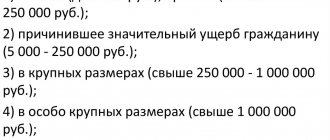Embezzlement is a common type of crime in corporate wars, which is regulated by Article No. 160 of the Criminal Code of the Russian Federation (“Misappropriation or embezzlement”).
Often, the article of embezzlement includes actions to withdraw assets from a company to legal entities affiliated or controlled by the accused, as well as fraud in the payment of bonuses - “golden parachutes”.
In addition, embezzlement is often used in conflicts between hired management and owners. To do this, shareholders simply need to choose certain actions of managers and, on behalf of the company, declare them either unprofitable or inconsistent and causing damage.
Practice
A striking example of the application of this article was the criminal prosecution to which the founder of the Baring Vostok fund, Michael Calvey, was subjected. Initially, one of the most high-profile economic cases of recent years against an American investor was opened under article of fraud, but later the charge was reclassified as embezzlement.
According to investigators, in 2021, Calvey stole 2.5 billion rubles from Vostochny Bank, which then belonged to Baring Vostok. The First Collection Bureau (at that time also controlled by an investment company) owed the bank 2.6 billion rubles, but instead of money it paid with shares of the IFTG fund. Investigators estimated the value of these securities at 600,000 rubles, while the appraiser appointed by the court determined a different level: 3.8 billion rubles. But due to restrictions in the IFTG charter, at the time of the transaction they were valued at approximately 260 million rubles.
Calvey himself, who after 2.5 years of investigation was sentenced to 5.5 years of probation, connected the criminal case against him with the corporate conflict over control over Vostochny, which was unleashed by his opponents from among the bank’s shareholders. Subsequently, Baring Vostok finally lost control of the bank.
The former owner of Yugra Bank, Alexey Khotin, and his alleged accomplices are accused of even larger embezzlement. In 2021, when the “hole” in the capital of the credit institution exceeded 160 billion rubles, it was declared bankrupt. At first, Khotin was accused of embezzling 7.5 billion rubles, but then the amount increased to 23.6 billion rubles.
Other notable embezzlement cases against entrepreneurs, bankers and financiers:
- former co-owners of Promsvyazbank Dmitry and Alexey Ananyev, who left Russia due to criminal prosecution, are accused of embezzlement of the bank's property entrusted to them in the amount of more than 66 billion rubles and $575 million;
- case against former co-owner of the Otkritie group Boris Mints. He and his two sons, Dmitry and Alexander, were charged with embezzlement of 34 billion rubles;
- the former head of the bankrupt Investment Bank, Vladimir Gezin, was sentenced to 3.5 years in prison for embezzlement of almost 13 billion rubles;
- former deputy chairman of the Central Bank Konstantin Korishchenko was arrested as part of the case of embezzlement of 3.2 billion rubles from the Investment Bank, which he headed in 2012;
- case against Orthodox businessman Vasily Boyko-Veliky about embezzlement of 89 million rubles together with the managers and shareholders of Credit Express Bank.
Restrictions in concepts
Despite the fact that the indicated acts belong to the group of crimes of a property nature, designated by Chapter 21 of the Criminal Code of the Russian Federation, certain differences are visible in their composition. Fraud is characterized by distinctive properties :
- Lack of attitude of the criminal to real rights to the misappropriated property.
- The use of special psychological techniques, as a result of which the victim “falls for the bait” of the scammer.
- Mandatory perjury, deception or misrepresentation. Establishing false contact with the victim based on trust.
- Receiving money or property rights directly from the hands of the victim.
- A criminal act has been discovered. After achieving the result, the criminal mostly disappears or creates a precedent of innocence.
Appropriation and embezzlement are characterized by the following features that distinguish them from other compounds:
- The presence of authority at the disposal of the abducted person, expressed in the official registration of receipt of material assets.
- Registration of acceptance of property in the absence of evidence of its transfer.
- There are no cunning schemes, the crime is carried out by simple seizure of the stolen property.
- False information is given not at the stage of preparation for theft, but after the crime has been committed - in order to avoid liability.
- Hidden action, an attempt to shift responsibility for the disappearance of property to third parties.
For example, if a realtor knowingly offers to purchase an apartment to which he does not have any official rights, this is fraud. These types of crimes are committed by building clever chains (more details about real estate fraud schemes are described here). Sometimes forged documents come into play, including those for the organization of a legal entity, under which a group of fraudsters disguises itself.
The assignment will be qualified:
- If the authorized person acts as an attorney who conducts a transaction with an apartment under a power of attorney actually received from the owner.
- In this case, the representative does not transfer the money received from the transaction to the real owner, but steals it.
Reference : embezzlement means the theft of money or property of the employer, and embezzlement means the theft of other entrusted property or money.
Errors in use
Embezzlement should not be confused with embezzlement. This is also a form of theft of someone else’s property, but “by establishing illegal possession over it.” And embezzlement is the illegal use of someone else's property, but not possession of it.
Embezzlement has certain similarities with fraud. In both cases, the victim himself transfers property to the criminal, by stealing which the latter abuses his trust. However, in fraud, the victim does so under the influence of deception or abuse of trust. And in case of embezzlement, the transfer takes place legally, after which the culprit steals the property that was entrusted to him for certain purposes.
This norm is called “rubber” in professional circles, because investigators can often adapt it to their needs in a specific situation without much effort.
Composition of the crime: fraud
The crime of fraud is mixed:
- formal;
- material.
A crime is determined by the fact of the crime. But without consequences, it is classified as attempted fraud. When the consequences occur, it’s like a crime committed and completed (we talked about what the moment and place of the end of a fraud crime is here).
The object of the crime is social relations, the right of property, which has been encroached upon by the perpetrator.
The subject of the crime is a fully capable person who has reached the age of 16 and is guilty of theft of property by committing actions classified as fraudulent.
The objective side contains all the facts of fraudulent actions, as a result of which the property rights of the victim were alienated to the criminal or a group of them.
The subjective side contains such parameters as intent, motive and purpose . In all cases, the intent is obvious:
- the offender knew that he was committing an illegal act;
- he reported on the onset of consequences.
The motive is always selfish. It consists of obtaining illegal profit by appropriating property that does not belong to the criminal. The goal is to obtain money or property rights illegally, using deception, misrepresentation, in order to subsequently dispose of what was received as one’s own.
Fact
According to Article 160 of the Criminal Code of the Russian Federation, the person guilty of embezzlement, depending on the severity of the crime, is punished:
- imprisonment for a term of up to ten years with restriction of freedom for a term of up to two years,
- a fine of up to 1 million rubles (or in the amount of the offender’s income for a period of up to three years),
- deprivation of the right to hold certain positions or engage in certain activities for a period of up to five years,
- correctional labor for up to one year,
- forced labor for up to five years with restriction of freedom for up to one year.
Aggravating circumstances include the commission of a crime by an organized group of persons, a group of persons by prior conspiracy, causing significant damage to the victim, or using an official position.
The most common punishment for embezzlement under especially aggravating circumstances is a suspended sentence. For the same crime, committed without aggravating circumstances, they are most often sentenced to correctional labor or a fine. In most cases, fines do not exceed 25,000 rubles.
Composition of the crime: embezzlement and embezzlement
The corpus delicti is material . All formal signs without consequences in the form of causing material damage to the owner of the property cannot be considered an attempt at misappropriation and embezzlement.
The object of the crime is social and labor relations, property relations against which the crime is committed.
The subject of the crime is special . They can only be an adult and capable person who has been entrusted with material assets according to an official document:
- employment contract;
- service agreement;
- act of acceptance and transfer;
- powers of attorney for the transfer of money or property;
- invoice, etc.
Important : before reaching the age of 18, employment that involves financial responsibility is not permitted by labor legislation.
The objective side contains the fact of transfer of money or material property to the perpetrator and the fact that he appropriated this property for himself. To do this, official papers must be drawn up that confirm the receipt of material assets.
The subjective side is characterized by the presence of intent, motive and purpose to commit an unlawful act. The intent is always deliberate: the attacker knows that material assets or money have been entrusted to him to perform certain actions, and is aware of the consequences of not performing them. The motive is selfish. Embezzlement or embezzlement is committed only for the sake of obtaining illegal profit . Target:
- to appropriate entrusted money in order to spend it at his own discretion;
- sell entrusted property and receive money;
- use stolen property to your advantage.
Such crimes are not committed unintentionally or without self-interest.
Signs of appropriation
The Plenum of the Armed Forces of the Russian Federation considers it completed if the following conditions were simultaneously met by the person to whom the property was entrusted by the owner. Signs of the act:
- Commitment by the accused of actions that ensure the non-return of entrusted property to its owner and contribute to its conversion to his own benefit.
- Transfer of material assets into the possession of the accused.
- The ability to dispose of property at will.
- The owner of the misappropriated valuables suffered material damage due to the inability to use and dispose of them.
Important . The main feature of misappropriation, which distinguishes it from embezzlement, is the transfer of property into the possession of another person in full and unchanged.
Commentary to Art. 160 of the Criminal Code of the Russian Federation
Misappropriation and embezzlement is a form of theft. Objective and subjective signs of a crime as a form of theft are disclosed in the commentary to Art. 158 of the Criminal Code of the Russian Federation. It should be borne in mind that the subject of misappropriation or embezzlement is somewhat broader than the subject of theft. As a general rule, the subject of this crime, as in theft, is someone else’s tangible movable property. But there is an exception to this rule - the subject of misappropriation and embezzlement, as in fraud, can be non-cash money and uncertificated securities. As for real estate, its appropriation in practice is usually qualified not as theft, but as abuse (Articles 285, 201 or 165 of the Criminal Code of the Russian Federation), although isolated exceptions to this rule can be noted.
The subject of misappropriation or embezzlement is not any property, but only property entrusted to the perpetrator. The concept of entrusted property includes the following features:
1) someone else’s property was transferred to the culprit on the basis of a civil contract (for storage, for rent, for use, for transportation, etc.);
2) the property was in the possession of the perpetrator due to labor or service relations (for example, all the property of an organization is under the control of the head of this organization) or by virtue of special powers (for example, when appointing an insolvency administrator).
Someone else's property transferred on the basis of a civil contract to any organization is, along with the organization's own property, under the jurisdiction of competent employees of this organization.
In order to recognize property as entrusted, the subject must have powers in relation to this property. Property transferred under protection (for example, to a security guard), under supervision (for example, to a casual acquaintance at a station), or to an ordinary employee to perform his functions is not entrusted. In case of theft of such property, the theft rule is applied (clause 18 of the Resolution of the Plenum of the Supreme Court of the Russian Federation of December 27, 2007 N 51 “On judicial practice in cases of fraud, misappropriation and embezzlement”).
Powers over entrusted property are usually documented, although this is not an essential feature of entrusted property. The form of the transaction has a purely civil legal significance and does not affect the qualifications of the act. The powers of an organization's employees in relation to property under their control are usually determined by local acts of this organization, an employment contract and additional agreements.
Embezzlement and embezzlement do not relate to theft (kidnapping), which causes some differences in the composition of this crime from the elements of theft, robbery and robbery. The main difference is that violation of someone else’s property is not an essential sign of misappropriation or embezzlement. Property that has left the owner’s possession and at the time of the commission of the act was in the legal possession of the embezzler (for example, transferred to him for safekeeping) can also be misappropriated and embezzled.
Misappropriation consists of gratuitous, committed for mercenary purposes, unlawful treatment by a person of the property entrusted to him in his favor against the will of the owner (clause 19 of the Resolution of the Plenum of the Supreme Court of the Russian Federation of December 27, 2007 N 51 “On judicial practice in cases of fraud, misappropriation and embezzlement").
Embezzlement is the illegal actions of a person who, for personal gain, has spent the property entrusted to him against the will of the owner by consuming this property, spending it or transferring it to other persons (clause 19 of the Resolution of the Plenum of the Supreme Court of the Russian Federation of December 27, 2007 N 51 “On judicial practice in cases of fraud, misappropriation and embezzlement").
In practice, the actions of the perpetrator are recognized as misappropriation when the property remains in the possession of the perpetrator for a more or less long period, and embezzlement when the property is immediately consumed or alienated in favor of another person. In this sense, appropriation can be called “retention,” and embezzlement can be called “withholding” of someone else’s entrusted property.
———————————
Russian criminal law. T. 2. Special part / Ed. A.I. Raroga. 2005. P. 191.
The distinction between embezzlement and embezzlement does not affect the qualification of the act. These actions often accompany and complement each other. In reality they are closely intertwined. For example, a person can appropriate the entrusted property, and after some time (a day, two, three days, a week) begin its daily systematic sale. Distinguishing appropriation from embezzlement under such circumstances is difficult and will essentially be an artificial distinction. Therefore, it seems correct to proceed from the fact that embezzlement and misappropriation are a single form (method) of theft, and that misappropriation and embezzlement can, with the same intent, constitute a single, ongoing theft. In the case where a person commits with sole intent the theft of property entrusted to him, one part of which is appropriated by him, and the other part of this property is wasted, the act does not form a set of crimes.
The composition of misappropriation or embezzlement is material. Misappropriation is considered a completed crime from the moment when the legal possession of the property entrusted to a person became illegal and this person began to take actions aimed at converting the said property to his own benefit (for example, from the moment when a person, through forgery, conceals the presence of entrusted property in his possession, or with moment of failure to fulfill a person’s obligation to deposit funds entrusted to that person into the owner’s bank account). Embezzlement should be considered a completed crime from the moment of unlawful withdrawal of entrusted property (its consumption, expenditure or alienation). It must be taken into account that, unlike theft, robbery or robbery, when appropriation and embezzlement, the real opportunity to arbitrarily use or dispose of someone else’s property may be available before the theft is committed. In such circumstances, the theft should be considered completed from the moment the act (action or inaction) is committed, depriving the owner of the opportunity to regain property in the usual way: hiding or moving property, alienating it, falsifying, concealing or destroying documents, etc.
Theft in the form of appropriation must be distinguished from the temporary borrowing of an item by the person to whom it was entrusted. If a person intended to return the embezzled property itself, identical property or another equivalent of the embezzled property, there is no element of misappropriation. If certain signs are present, such actions should be qualified as arbitrariness (Article 330 of the Criminal Code of the Russian Federation) or as abuse of power (Article 201 or 285 of the Criminal Code of the Russian Federation).
When establishing the amount to which a person has committed misappropriation or embezzlement, it must be borne in mind that the theft of property with its simultaneous replacement with a less valuable one qualifies as theft in the amount of the value of the seized property.
The subject of this crime is a special one - a sane person who has reached the age of sixteen and who has been entrusted with someone else's property. The Supreme Court of the Russian Federation proceeds from this understanding of the subject of this crime in paragraph 22 of Resolution No. 51 of December 27, 2007 “On judicial practice in cases of fraud, misappropriation and embezzlement”: “Only the person who owns someone else’s property can be the perpetrator of the misappropriation or embezzlement was entrusted by a legal entity or individual on a legal basis for a specific purpose or for a specific activity. Based on the provisions of Part 4 of Article 34 of the Criminal Code of the Russian Federation, persons who do not have the indicated signs of a special subject of misappropriation or embezzlement, but who directly participated in the theft of property in accordance with a preliminary agreement with the person to whom this property was entrusted, must bear criminal liability under Article 33 and Article 160 of the Criminal Code of the Russian Federation as organizers, instigators or accomplices.”
The qualifying signs of embezzlement and embezzlement are interpreted in the same way as the qualifying signs of theft and fraud (see commentary to Articles 158 and 159 of the Criminal Code of the Russian Federation), taking into account the fact that the subject of this crime is special. Therefore, the theft of entrusted property should be considered committed by a group of persons by prior conspiracy if the crime involved two or more persons who meet the specified characteristics of a special subject of misappropriation or embezzlement (for example, the head of the organization in whose jurisdiction the stolen property is located, and an employee who bears material under the contract responsibility for this property), who agreed in advance to jointly commit a crime (clause 22 of the Resolution of the Plenum of the Supreme Court of the Russian Federation of December 27, 2007 N 51 “On judicial practice in cases of fraud, misappropriation and embezzlement”).
In accordance with Part 3 of Art. 35 of the Criminal Code of the Russian Federation, an organized group should be understood as a stable group of persons who have united in advance to commit one or more crimes. An organized group is distinguished by the presence of an organizer (leader), the stability of the group members, the distribution of roles between them in preparation for a crime and its actual commission. Based on this, an organized group may include persons who do not have the authority to dispose, manage or use entrusted property, as well as to deliver or store it, who have previously united to commit one or more crimes. If there are grounds for this, they are liable in accordance with Part 4 of Art. 34 of the Criminal Code of the Russian Federation as organizers, instigators or accomplices of appropriation. Organizers and leaders are responsible for all crimes committed by an organized group if they were included in their intent. Other members of an organized group are held accountable for crimes in the preparation or commission of which they participated (Article 35 of the Criminal Code of the Russian Federation) (clause 23 of the Resolution of the Plenum of the Supreme Court of the Russian Federation of December 27, 2007 No. 51 “On judicial practice in cases of fraud, misappropriation and embezzlement").









